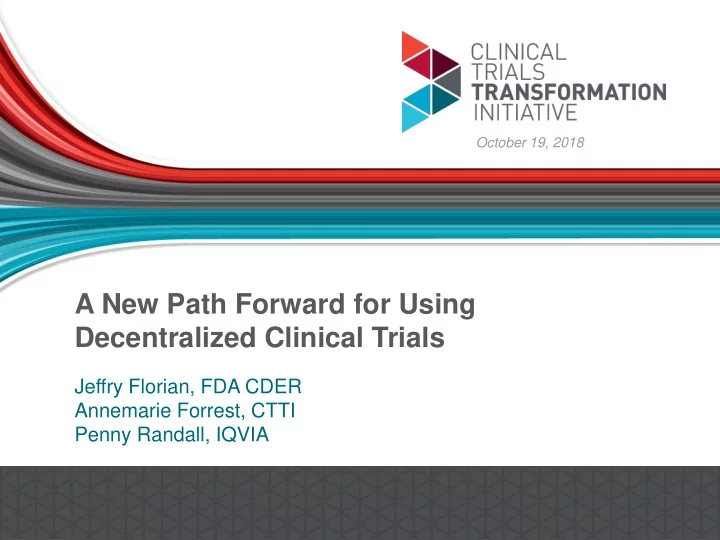

October 19, 2018 A New Path Forward for Using Decentralized Clinical Trials Jeffry Florian, FDA CDER Annemarie Forrest, CTTI Penny Randall, IQVIA
Disclaimer The views and opinions expressed in this presentation are those of the individual presenter and do not necessarily reflect the views of the Clinical Trials Transformation Initiative.
CTTI Strengths Public-private partnership Co-founded by Duke University & FDA Involves all stakeholders 80+ members MISSION: To develop and drive adoption of practices that will increase the quality and efficiency of clinical trials
Mobile Clinical Trials (MCT) Program PURPOSE: Develop evidence-based recommendations that affect the widespread adoption and use of mobile technology in clinical trials for regulatory submission. ANTICIPATED IMPACT: Increased number of clinical trials leveraging mobile technology. More efficient trials generating better quality information. MCT Program Novel Mobile Stakeholder Decentralized Clinical Trials Endpoints Technologies Perceptions * Scope: FDA-regulated clinical trials after the time of initial research volunteer consent
Benefits of Using Decentralized Trials
Recommendations Sections 1. DCT Approaches and Protocol Design 2. Telemedicine State Licensing Laws 3. Mobile Healthcare Providers 4. Drug Supply Chain 5. Investigator Delegation and Oversight 6. Safety Monitoring
Not All-or-Nothing Approach Mobile or healthcare provider (HCP) for certain activities E.g. blood draws, vital sign measurements, trial drug injections Trial participants use telephone or video conferencing to determine eligibility, discuss trial progress, or review participant’s questions Visit facility when requiring major medical equipment E.g. x-rays, magnetic imaging, tomography scans In single trial, enroll some patients at traditional trial sites, while others managed in decentralized or remote manner
1) Engaging Key Stakeholders in Protocol Design Incorporate SOPs that describe processes that are unique to DCT elements Meet with regulatory bodies early in the process Numerous examples of specific meeting types and relevant FDA offices are provided Engage and learn from experienced vendors DCT trial executors with telemedicine and/or mobile HCP experience
2) Mobile Healthcare Providers Consult or partner mobile HCP vendor with experience conducting clinical trial activities Specific credentials, experiences, and training are included in recommendations Possible mobile HCP protocol contributions: Blood draws and biological sampling Investigational medical product (IMP) administration Trial participant training (e.g. IMP self- administration) Clinical assessments In-home compliance checks (e.g. timely completion of trial participant diary, proper storage of IMP)
3) Telemedicine State Licensing DCTs operating across numerous states can: Maintain an investigator in each active trial state Utilize investigators licensed in multiple states Contract with vendors providing mobile HCP services across U.S. Keep abreast of complex and varying state-by-state legal landscape Use online policy resource centers Dedicate internal legal staff or seek external legal consultants
4) Drug Supply Chain Review state laws regarding direct-to- patient shipment Describe direct-to-patient shipment procedures in protocol Provides necessary clarity to investigators, IRBs, and regulatory agencies Consider engaging IMP vendor management vendor with experience shipping IMP directly to patients Formalize SOPs for the IMP accountability chain
5) Investigator Delegation and Oversight Highly protocol specific Routine care / practice of medicine vs. clinical trial related activities Delegation of authority considerations and responsibilities Determine who belongs on the Form FDA 1572
6) Safety Monitoring Highly protocol specific Clearly articulate procedures and train investigative staff on processes that are unique to DCTs Ensure trial participants knows procedures related to possible AEs (e.g. list of approved local facilities) Pre-coordination efforts between investigators and approved facilities/clinicians Develop protocol-specific safety monitoring and communication escalation plans
Discussion / Q&A
THANK YOU. Annemarie Forrest annemarie.forrest@duke.edu www.ctti-clinicaltrials.org
Recommend
More recommend